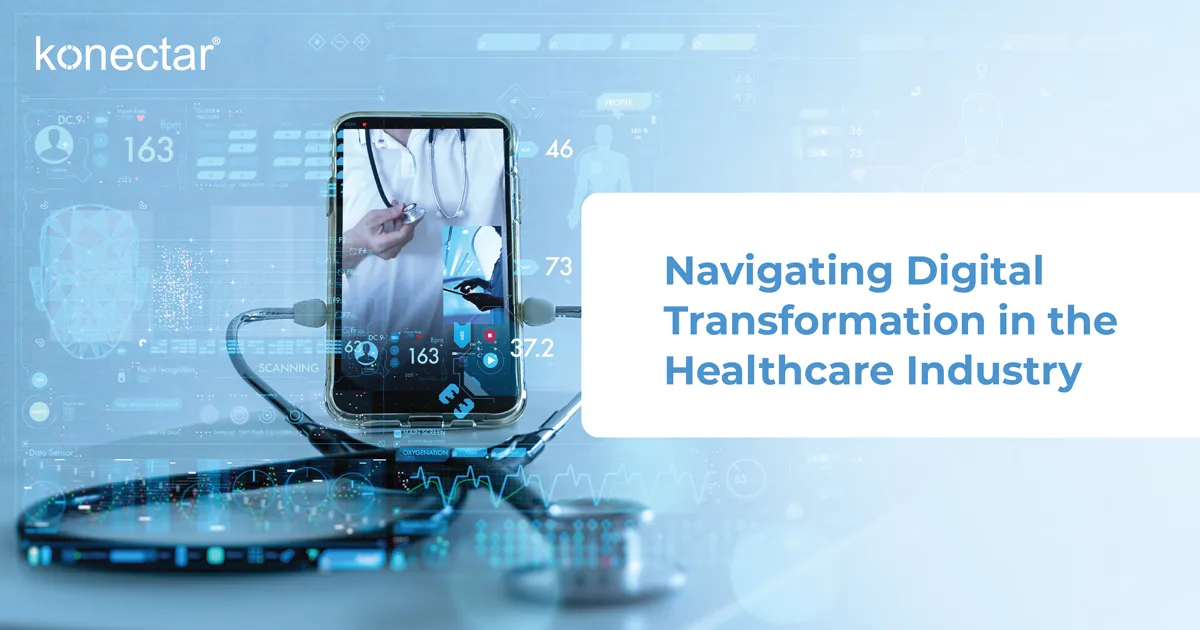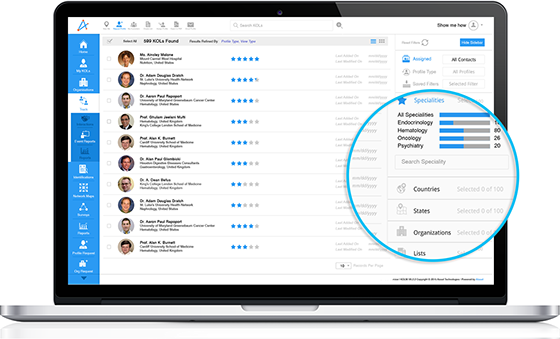04-07-2024
Navigating Digital Transformation in the Healthcare Industry

Digital transformation in the healthcare industry is changing how healthcare is delivered, managed, and experienced by both patients and providers. While this sort of transformation took other sectors by storm, its application in healthcare was steady and gradual. Nonetheless, today, major aspects of the healthcare sector have been digitized. This has empowered the healthcare providers to deliver care more efficiently.
In this article:
How has Digital Transformation changed Healthcare?
Digital transformation in healthcare has empowered patients to actively participate in their healthcare journey. They can now book health tests from the comfort of their homes, access their medical records, and schedule online appointments via telemedicine.
Electronic health records (EHRs) have helped healthcare providers record patient data conveniently and access it easily. Telemedicine and remote patient monitoring have improved communication between patients and healthcare providers. This has led to faster diagnoses and more personalized treatment plans. What's more, patients are not required to travel long distances to meet a specialist physician. This has enabled the aged, disabled, and those living in far-flung areas to seek immediate medical attention, saving cost and time.
Implementation of digital tools has streamlined administrative tasks, reduced paperwork, and improved data management in hospitals and clinics. As a result, healthcare providers are able to devote much of their time and resources to patient care.
The inception of big data analytics in the healthcare industry has made it easier to access large data sets of patients and provide valuable insights into patient populations, disease trends, and treatment outcomes. This has led healthcare providers to make evidence-based decisions for both research and clinical practice.
Technologies Shaping Healthcare
Several emerging technologies are transforming the healthcare industry further. These include:
AI finds wide applications in healthcare. Right from accessing and analyzing vast amounts of data, images and improving diagnostics, treatment planning, and drug discovery to providing business analytics in healthcare industry, AI has helped advance the sector for sure.
Blockchain technology is used to create safe and transparent platforms for managing patient data and medical records. It is extensively used to maintain transparency in supply chains, EHRs, smart contracts in insurance, and verification of medical staff credentials, among other things.
IoT, such as wearable devices and sensors, is being widely used by patients and even recommended by healthcare professionals as it helps to depict and collect real-time patient data. This allows for personalized health management and enabling remote monitoring.
VR and AR like AI has wide applications in the healthcare industry. They are used in medical training, surgery simulation, and treatment of conditions like phobias and pain.
While telehealth and remote monitoring devices have been around for many years now, their usage has picked up during the COVID-19 pandemic. These technologies allow providers to deliver care remotely and expand access to healthcare for patients in rural or underserved areas.
Digital marketing has helped the healthcare sector evolve. Hospitals and healthcare institutes are resorting to digital marketing strategies to promote their services, facilities and how their treatment has helped people overcome health issues and live a quality life.
Barriers to Successful Digital Transformation in Healthcare
While the benefits of digital transformation are straightforward, several challenges need to be addressed:
Protecting sensitive patient data from cyberattacks is a major concern. Strong security measures are essential for building trust and ensuring patient privacy.
Different healthcare systems often lack interoperability, making it difficult to share data seamlessly. This can hinder collaboration and care coordination.
Some healthcare professionals and patients may be hesitant to embrace new technologies or disrupt existing workflows. At such times, change management strategies should be intrduced to address these concerns.
Not everyone has the same access to technology or digital literacy skills. This digital divide can add to existing health disparities.
Implementing new technologies can prove to be expensive for healthcare organizations.
Overcoming the Challenges
Successful implementation of digital transformation necessities several key strategies. Firstly, defining a clear vision and goals is crucial. This means coming up with the purpose and desired outcomes of digital transformation strategy.
Investing in the right technology is also fundamental. Selecting technology solutions that meet specific needs and ensuring they integrate seamlessly with existing systems can significantly enhance efficiency.
Embracing a culture of innovation among healthcare providers is another important strategy. This involves encouraging a willingness to experiment with new technologies as it will eventually drive continuous improvement in operations, diagnosis, supply chain management etc.
Prioritizing data security is equally vital. Implementing strong security measures and adherence to compliance with data privacy regulations can protect sensitive information and maintain trust.
Additionally, up-skilling the workforce by providing training to healthcare professionals ensures they can effectively utilize new technologies to enhance patient care and make evidence-based decisions.
Many times, life sciences companies have to collaborate with Key Opinion Leaders to drive various objectives. Hence, the identification of the right healthcare professionals that align with the pharma team's goals remains a crucial process. In this context, konectar, an AI-powered healthcare analytics platform, offers deep insights into the HCP landscape to enable life sciences teams to discover, profile, and engage the right medical professionals. For more information, request a demo of konectar!
FAQs
- What are the biggest barriers to implementing digital transformation in healthcare?
Some common barriers to healthcare include cybersecurity concerns, interoperability issues, resistance to change, and the cost of implementation.
- How can healthcare organizations address cybersecurity concerns?
Cybersecurity concerns can be addressed by implementing strong security measures like encryption, regularly updating systems, and providing cybersecurity training for staff.
- What are the main technologies driving digital transformation in healthcare?
Artificial Intelligence (AI), Digital Marketing, Blockchain, Internet of Things (IoT), Virtual Reality (VR) and Augmented Reality (AR), and telehealth and remote patient monitoring are some key technologies that are driving transformation in healthcare.





